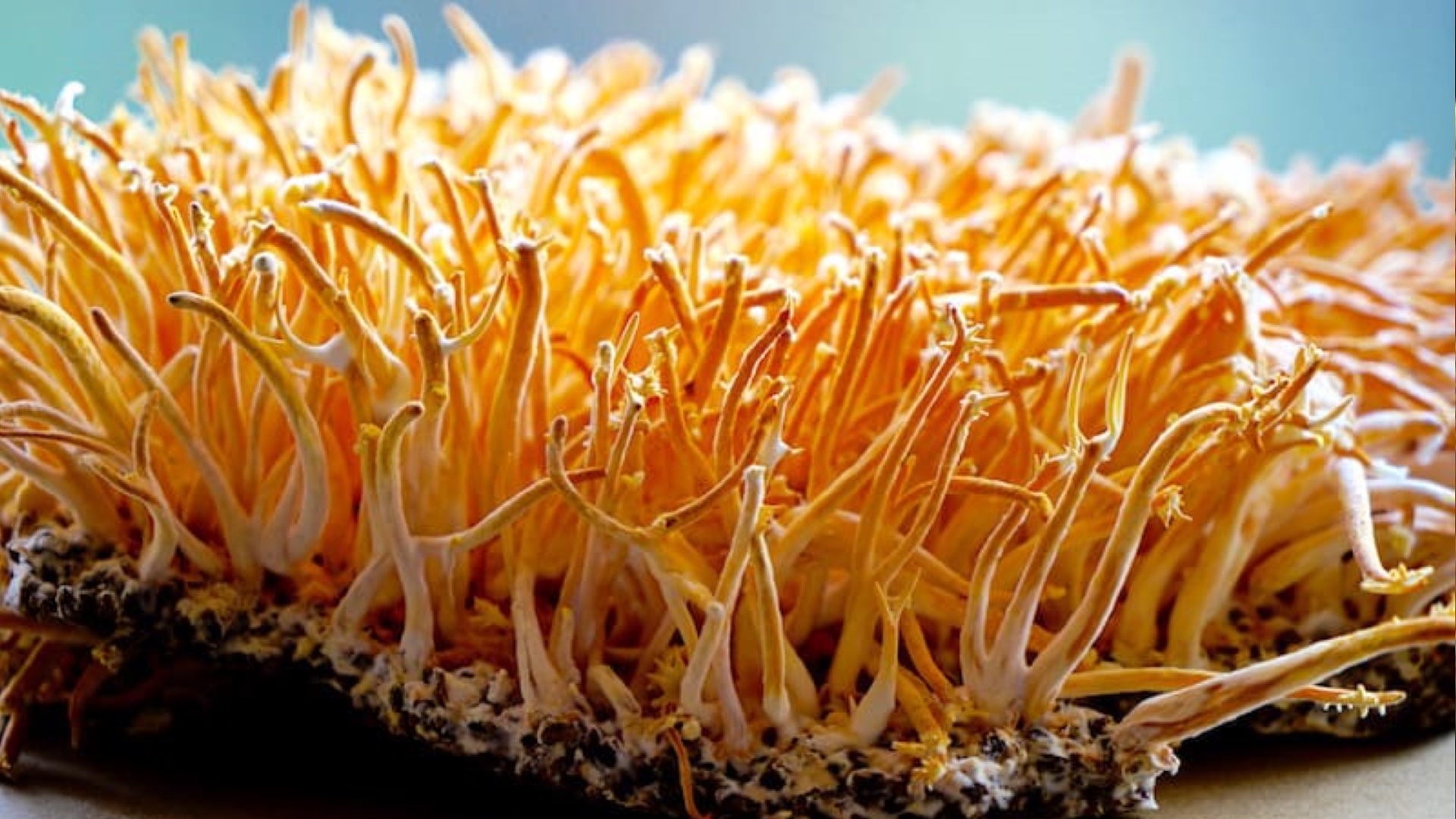Introduction
In the world of functional mushrooms, Cordyceps (Cordyceps sinensis) stands out as a unique and fascinating species known for its potential health benefits. Traditionally used in Chinese and Tibetan medicine, Cordyceps has gained popularity in modern times for its adaptogenic properties and diverse array of bioactive compounds. This comprehensive guide explores the historical use, nutritional components, and the scientific evidence supporting the various advantages of Cordyceps functional mushrooms in promoting overall well-being.
Understanding Cordyceps Mushrooms
Cordyceps mushrooms belong to the Ascomycota phylum and are renowned for their intriguing life cycle. This parasitic fungus primarily infects insects, such as caterpillars, transforming them into a fungal mass that eventually grows into a stalk-like structure. While Cordyceps sinensis is the traditional species used in herbal medicine, other Cordyceps species, such as Cordyceps militaris, are cultivated for commercial purposes.
Nutritional Composition
Cordyceps mushrooms are rich in bioactive compounds, including cordycepin, polysaccharides, nucleosides, sterols, and various antioxidants. These compounds contribute to the unique health-promoting properties of Cordyceps, making it a valuable addition to the world of functional mushrooms.
Historical Use
Cordyceps has a long history of use in traditional Chinese and Tibetan medicine, dating back over a thousand years. It was traditionally employed to address a range of health issues, including fatigue, respiratory conditions, and kidney disorders. Cordyceps was also considered a tonifying herb, believed to enhance vitality, stamina, and overall well-being.
Benefits of Cordyceps Functional Mushrooms
Adaptogenic and Energizing Properties
Cordyceps is celebrated for its adaptogenic qualities, meaning it helps the body adapt to stress and maintain balance. Traditional use of Cordyceps includes its role in combating fatigue and increasing energy levels. Research suggests that Cordyceps may enhance the production of adenosine triphosphate (ATP), the primary energy currency of cells, contributing to improved energy metabolism.
Respiratory Health Support
Cordyceps has been traditionally used to support respiratory health. Studies suggest that Cordyceps may have bronchodilator effects, helping to relax the airways and improve airflow. This makes Cordyceps a potential ally for individuals dealing with respiratory conditions such as asthma or chronic obstructive pulmonary disease (COPD).
Exercise Performance and Endurance
Athletes and fitness enthusiasts have turned to Cordyceps for its potential benefits in exercise performance and endurance. Research indicates that Cordyceps may improve oxygen utilization, enhance aerobic capacity, and reduce fatigue during prolonged physical activity. These effects make Cordyceps a popular choice among those looking to optimize their athletic performance.
Immune System Modulation
Cordyceps mushrooms possess immunomodulatory effects, meaning they can enhance or regulate immune function. Compounds like polysaccharides and cordycepin found in Cordyceps have been studied for their ability to stimulate immune cells, supporting the body’s defense against infections and diseases.
Antioxidant Defense
Cordyceps is rich in antioxidants that help neutralize free radicals in the body. Free radicals are unstable molecules that can cause cellular damage and contribute to aging and various diseases. The antioxidant properties of Cordyceps contribute to its ability to combat oxidative stress and promote overall cellular health.
Kidney Health and Tonifying Effects
Traditional use of Cordyceps includes its tonifying effects on the kidneys. In traditional Chinese medicine, Cordyceps is often prescribed to support kidney health and address conditions related to kidney deficiency. The mushroom’s potential to modulate kidney function aligns with its historical use as a tonic for vitality.
Antidiabetic Effects
Emerging research suggests that Cordyceps may have antidiabetic properties. Studies have explored its potential to regulate blood sugar levels, improve insulin sensitivity, and protect pancreatic cells. These effects make Cordyceps a subject of interest in the context of managing diabetes and metabolic health.
Anti-Inflammatory Properties
Chronic inflammation is implicated in various health conditions, including cardiovascular disease, arthritis, and neurodegenerative disorders. Cordyceps mushrooms exhibit anti-inflammatory properties, helping to modulate the inflammatory response and potentially reduce the risk of chronic inflammatory diseases.
Practical Considerations and Safety
Dosage and Formulation
Determining the appropriate dosage of Cordyceps functional mushrooms depends on various factors, including individual health status and specific health goals. Cordyceps supplements are available in various forms, including extracts, capsules, and powders. Consulting with a healthcare professional or a qualified herbalist can provide personalized guidance on dosage and formulation.
Quality and Source
The quality and source of Cordyceps supplements are crucial for their effectiveness. Reputable manufacturers ensure the extraction of bioactive compounds through standardized processes. Third-party testing for purity and potency provides assurance of the product’s quality.
Potential Side Effects
Cordyceps is generally considered safe for most people when consumed in appropriate amounts. However, some individuals may experience mild side effects, including digestive issues or allergic reactions. It’s advisable to start with a lower dose and monitor for any adverse reactions. Pregnant or breastfeeding individuals and those with pre-existing health conditions should consult with a healthcare professional before using Cordyceps supplements.
Drug Interactions
Cordyceps supplements may interact with certain medications, including immunosuppressants and anticoagulants. Individuals taking medications should consult with their healthcare provider before incorporating Cordyceps into their routine to avoid potential interactions.
Conclusion
Cordyceps functional mushrooms, with their rich history in traditional medicine and compelling scientific support, offer a multifaceted approach to health and well-being. From their adaptogenic and energizing properties to their potential benefits in respiratory health, exercise performance, and immune modulation, Cordyceps stands as a versatile and holistic ally in the pursuit of optimal health.
As the interest in functional mushrooms continues to grow, Cordyceps occupies a unique position in the realm of natural remedies. Whether consumed as part of a balanced diet or integrated into a carefully formulated supplement, Cordyceps provides a bridge between ancient wisdom and modern scientific understanding, offering a comprehensive approach to health that addresses the intricate interplay of the body, mind, and vitality.
- Comprehensive Review of the Best CBD Oils Top Picks and Insights By swdistro - September 20, 2024
- Complete Review of the Top CBD Gummies By Golden Goat CBD - August 23, 2024
- Pine Queen Dream Marijuana Strain A Comprehensive Guide - December 14, 2023




